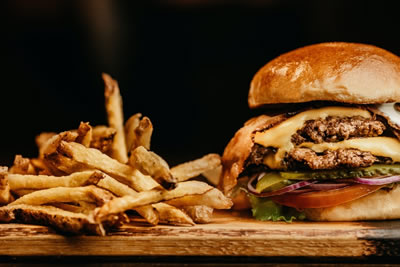7 Reasons for Unintentional Weight Gain

Weight gain can be extremely frustrating, especially when you don't know what's causing it. While diet typically plays the largest role in weight gain, other factors - such as stress and lack of sleep - may contribute as well. Here are 7 causes of unintentional weight gain.
1. Too much highly processed food
Many healthy foods, such as oats, frozen fruit, and yogurt, are minimally processed. However, highly processed foods, including sugary cereals, fast food, and microwave dinners, pack a bunch of harmful ingredients, as well as added sugars, preservatives, and unhealthy fats.
Highly processed foods are typically packed with calories yet devoid of essential nutrients, such as protein and fibre, which keep you feeling full. For these reasons you should consider cutting out processed meals and snacks, focusing instead on whole foods.
2. Too much sugar
Regularly downing sugary foods and beverages, such as candy, cakes, soft drink, sports drinks, ice cream, iced tea, and sweetened coffee drinks, can easily enlarge your waistline.
Many studies link sugar intake not only to weight gain but also an increased risk of chronic health conditions, including type 2 diabetes and heart disease.
3. A sedentary lifestyle
Inactivity is a common contributor to weight gain and chronic diseases. Working a desk job, watching TV, driving, and using a computer or phone are all sedentary activities.
Making a few simple lifestyle changes, such as exercising and sitting less, can make a big difference. Even small adjustments, such as taking a walk after dinner instead of watching TV, working out or walking during your lunch break, investing in a standing or treadmill desk, or riding your bike to work, can counter weight gain.
4. Yo-yo dieting
Yo-yo dieting refers to cycles of intentional weight loss followed by unintentional weight regain. Notably, this pattern is linked to an increased risk of weight gain over time.
Studies reveal that restrictive eating and dieting may lead to future weight gain due to your body's physiological responses to such behaviors, such as changes in hunger and fullness hormones. Plus, most people who lose weight through restrictive dieting gain back most or all of it within 5 years.
To keep weight off long term, you should focus on sustainable lifestyle changes. These include exercise, cutting out processed and sugary foods, and eating nutrient-dense, whole foods rich in fibre and protein.
5. Not enough sleep
Sleep is essential for overall health and well-being. Insufficient sleep may trigger weight gain, among other negative effects.
In a 2-week study in 10 adults with excess weight following a low-calorie diet, those who slept 5.5 hours per night lost 55% less body fat and 60% more muscle mass than those who slept 8.5 hours per night. As such, increasing your sleep time may aid weight loss.
If you have poor sleep quality, you can try limiting screen time before bed, reducing your caffeine intake, and going to sleep at a consistent time.
6. Not enough whole foods
If you regularly eat processed foods, switching to a diet that's higher in whole foods is an easy and effective way to promote weight loss and improve many other aspects of your health. In fact, the most important factor in weight loss is choosing whole, minimally processed foods.
Incorporating whole foods into your diet doesn't have to be difficult. Start by slowly adding more nutrient-dense whole foods, such as vegetables, fruits, beans, eggs, nuts, and seeds, into your meals and snacks.
7. Chronic Stress
Chronic stress is a common problem that can affect your weight. High levels of the stress hormone cortisol have been shown to increase hunger and your desire for highly palatable, calorie-dense foods, which can cause weight gain.
Interestingly, stress management may promote weight loss. To reduce stress, try incorporating effective relaxation practices into your routine. These include yoga, spending time in nature and just getting out of the house and going for a walk, either alone or with your dog.

